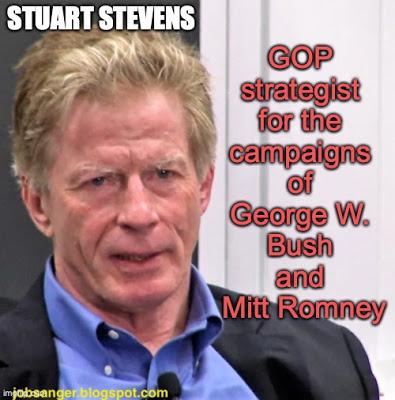 There are a few Republicans who look with horror at what has happened to their party under Donald Trump. One of those is Stuart Stevens (who was an aide and strategist for George W. Bush and Mitt Romney in their presidential campaigns).
There are a few Republicans who look with horror at what has happened to their party under Donald Trump. One of those is Stuart Stevens (who was an aide and strategist for George W. Bush and Mitt Romney in their presidential campaigns).Recently, Mr. Stevens did an interview with Joe Hagan for Vanity Fair magazine. The interview is excellent, and I recommend you read the entire interview.
Here are some interesting quotes by Stuart Stevens from that interview:
"The idea that you should vote for Donald Trump to stop what’s happening under Donald Trump is sort of illogical."
"You have this confluence of long-term factors that are playing out here. There’s an anti-science element that’s developed in the Republican Party, an anti-expert element, an anti-truth element. And they have combined in this toxic brew that is killing tens of thousands of Americans."
"I believed that there was a core set of beliefs that, say, 90% of the party would have agreed on, were fundamental, definitional, nonnegotiable for the Republican Party: personal responsibility, character counts, strong on Russia, deficit matters, fiscal sanity, free trade, strongly pro-legal immigration. These were fundamental, nonnegotiable bedrock principles that define what it was to be a Republican. So, Trump is not that, the party now has drifted away from those. The party is actively against each of those. We are the character-doesn’t-count party. We are to the left of Bernie Sanders on trade, as far as I can figure out any coherent policy to it. We’re [Vladimir] Putin’s poodle. And so, then you say, How does anybody abandon deeply held beliefs in three, four years? and I think the answer is you don’t. It just means you didn’t deeply hold them."
"It’s hard to be self-critical of why it is we’ve lost a popular vote every year since ’88, except 2004. And the answers were pretty obvious but still important to state: the need to appeal to more nonwhites, the need to appeal to younger voters, the need to appeal to more women, particularly single women. What’s interesting though is these are now presented not just as political necessities but as a moral mandate, that if you deserve to be the governing party of this big, confusing, loud, changing country, you need to reflect these things. So, everybody agreed and nodded. And then we got to Donald Trump and we just threw it all out the window kind of like an audible sigh of relief, like thank God, we don’t have to pretend we actually care about this stuff. We can still just win with white people. And it just exposes how completely phony it was. I think Trump looked at the Republican Party with sort of an animal instinct and realized that this is a group of weak people who don’t really believe in anything, except winning, except power. And if I can give them power, they will allow me to be whatever I want to be. And I think he was right."
"In [1993], Bill Clinton proposes a tax increase. It passes by one vote. At the time, every Republican predicted economic Armageddon. This was a time when Dr. Kevorkian was a popular cultural figure, the assisted suicide doctor, and they refer to it as a Kevorkian tax increase. So, I made a million ads about that. And we won every race in 1994 on that message. Guess what? We were wrong. It helped launch one of the greatest periods of economic expansion and growth in the history of the country. And Clinton was the last president to wrestle the deficit to some sort of standstill. So, I think you have to learn from facts. I think that there’s been a deeply flawed economic theory at the heart of a lot of Republican economics."
"I think Trump did exactly what George Wallace did. He said that there are these reasons that you, as a white person, are not living a life that you want to live. And it’s someone else’s fault. It’s Mexicans, it’s Muslims. There was a strong anti-Semitic [streak] at the end of the Trump campaign with global code for any surmounting international Jewish-banker conspiracy. The Republican Party allowed it to happen. This isn’t about Trump—it’s about the party."
"I came across the stats: of Americans 15 and under, the majority are nonwhite. So odds are looking really good they’re going to turn 18 and still be nonwhite. And what does that mean for the Republican Party? It’s a death sentence if the party doesn’t change, and the party has no desire to change."
"I think we live in a two-party system. It’s either Biden or Trump. I spent most of my life criticizing the Democratic Party—I don’t think it’s perfect. But I think the Democratic Party has responded to this moment in a much more legitimate, defensible way than the Republican Party has. So, yeah, I’ll work for Democrats and that’s who I’ll vote for. It’s a party that hasn’t disqualified itself."

